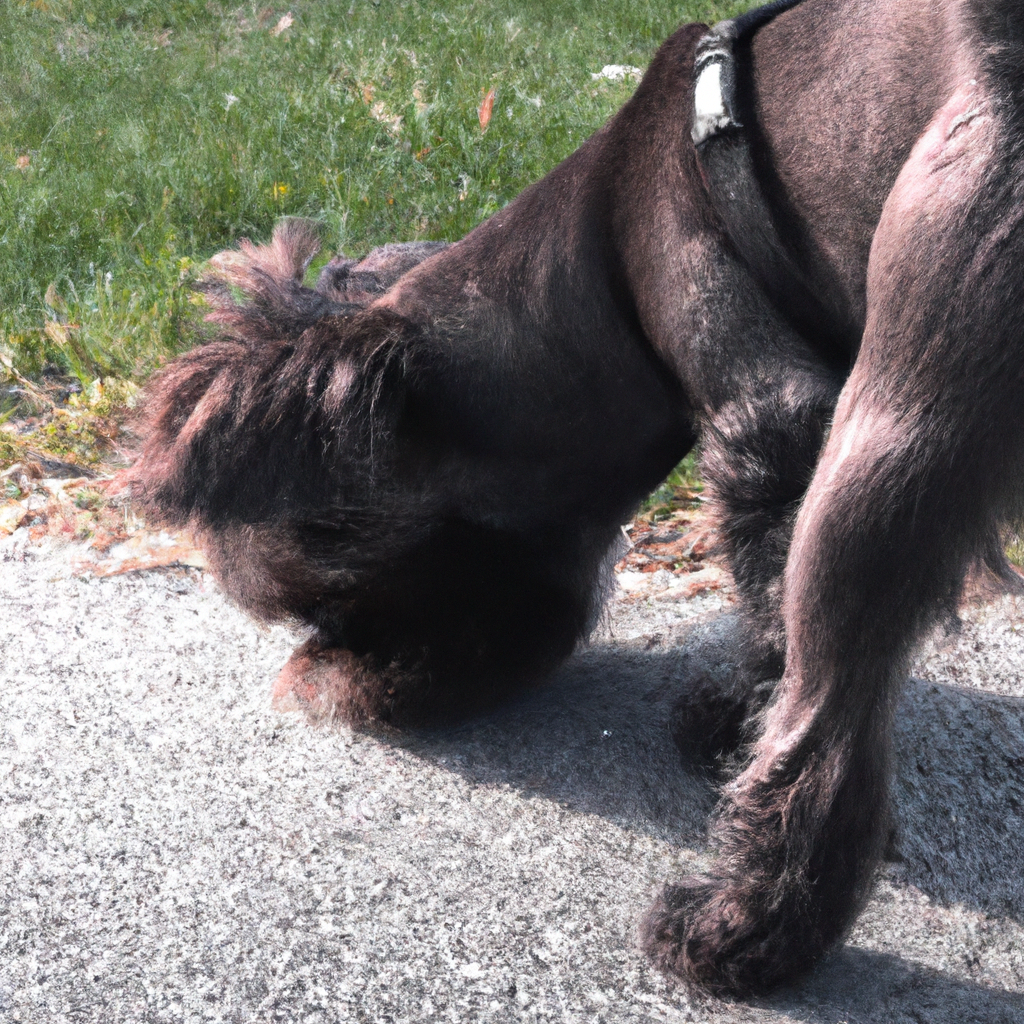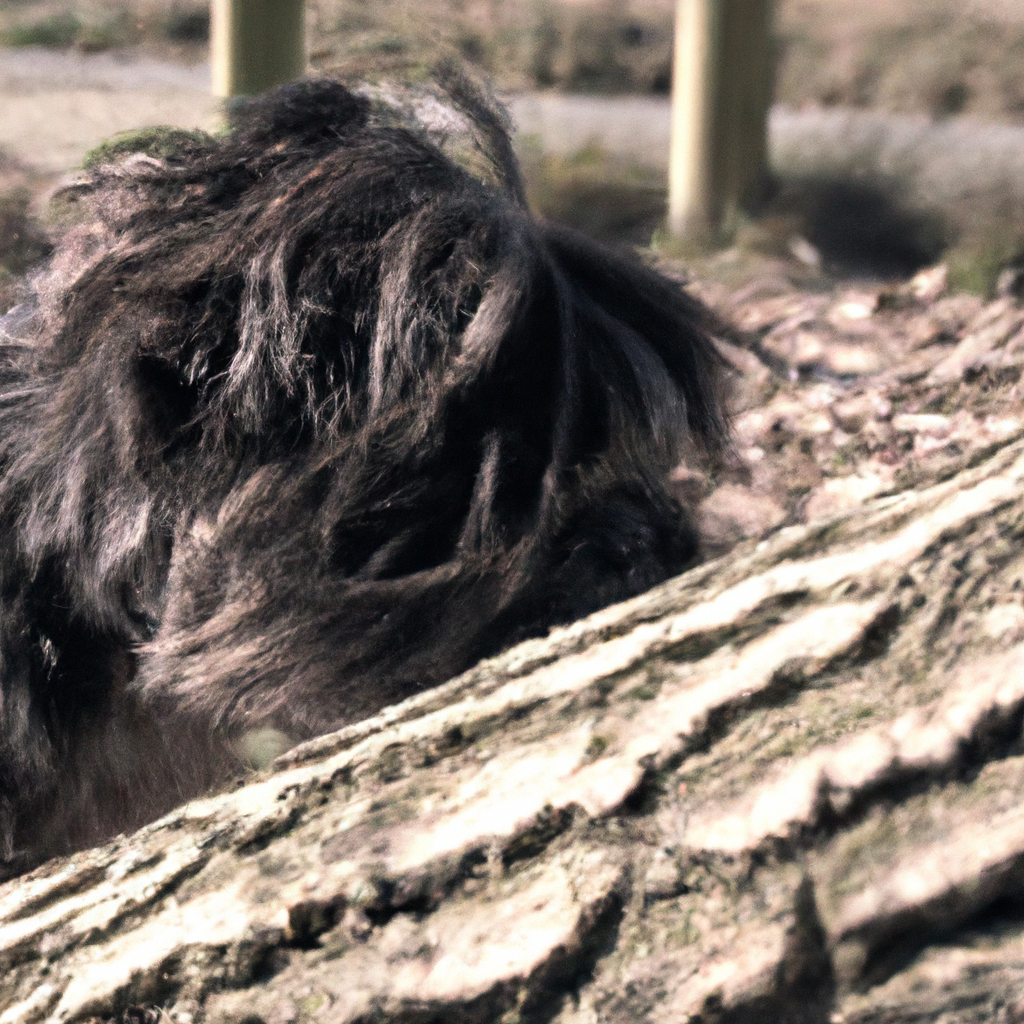The Affenpinscher, also known as the “Monkey Terrier”, is a small dog breed known for its distinctive appearance and energetic personality. However, these dogs are also known for their frequent barking. Understanding why an Affenpinscher barks so much involves exploring various factors such as their breed characteristics, environment, training, and overall health. This introduction will delve into these aspects to provide a comprehensive understanding of the barking behavior of Affenpinschers.
Understanding the Affenpinscher’s Barking Behavior
The Affenpinscher, affectionately known as the “Monkey Dog” due to its primate-like appearance and playful nature, is a small breed that’s big on personality. One characteristic that often stands out is their propensity to bark. If you’ve ever wondered why your Affenpinscher barks so much, you’re not alone. Understanding the Affenpinscher’s barking behavior can help you better communicate with your furry friend and manage their vocalizations effectively.
Firstly, it’s important to remember that barking is a natural behavior for all dogs. It’s one of the primary ways they communicate. However, the Affenpinscher’s barking tendencies can be traced back to their origins. Originally bred in Germany to hunt rats and other pests, these dogs were valued for their alertness and tenacity. Their barking served as a warning signal to their human companions about potential threats. So, when your Affenpinscher barks, they’re often just doing what comes naturally to them.
However, the Affenpinscher’s barking isn’t always about alerting you to danger. Sometimes, it’s simply a way for them to express their feelings. Affenpinschers are known for their bold and adventurous personalities. They’re also incredibly social creatures who thrive on interaction. If they’re feeling bored, lonely, or anxious, they might bark to get your attention. Similarly, if they’re excited or happy, they might bark to express their joy. Understanding these emotional triggers can help you respond appropriately to your Affenpinscher’s barking.
Another factor to consider is the Affenpinscher’s territorial nature. Despite their small size, these dogs are fiercely protective of their homes and families. If they perceive a threat, such as a stranger approaching their territory, they’re likely to bark in response. This behavior can be managed through proper training and socialization, teaching your Affenpinscher to distinguish between real threats and harmless situations.
While understanding the reasons behind your Affenpinscher’s barking is crucial, it’s equally important to know how to manage it. Excessive barking can be disruptive and stressful for both you and your dog. Training is key here. Teaching your Affenpinscher commands like “quiet” or “enough” can help control their barking. Positive reinforcement, such as treats or praise, can be effective in encouraging quiet behavior.
However, it’s essential not to punish your Affenpinscher for barking. Remember, it’s a natural behavior and a way for them to communicate with you. Instead, try to address the root cause of the barking. If they’re bored, provide them with toys or engage them in play. If they’re anxious, try to create a calm and secure environment. If they’re barking at perceived threats, work on socialization and training.
In conclusion, the Affenpinscher’s barking behavior is a combination of their breed characteristics, emotional state, and environmental factors. By understanding these elements, you can better communicate with your Affenpinscher and manage their barking effectively. Remember, every Affenpinscher is unique, and what works for one might not work for another. Patience, understanding, and a good sense of humor are all part of the journey when living with these charming and spirited dogs.
The Role of Genetics in Affenpinscher’s Excessive Barking
Affenpinschers, affectionately known as “Monkey Dogs,” are small but mighty creatures known for their distinctive appearance and lively personality. One characteristic that often stands out is their propensity for excessive barking. If you’ve ever wondered why your Affenpinscher barks so much, you’re not alone. Many owners have pondered this question, and the answer lies in the fascinating world of canine genetics.
Genetics play a significant role in shaping a dog’s behavior, including their barking habits. The Affenpinscher breed, like many others, has been selectively bred over generations to perform specific tasks. Originating in Germany, these dogs were initially used to keep kitchens, stables, and shops free from rats and other pests. Their small size allowed them to chase and corner vermin in tight spaces, while their loud bark served to alert their human companions of the intruder’s presence. This historical role as a ratter has ingrained a high level of alertness and a strong instinct to bark in the Affenpinscher’s genetic makeup.
However, it’s not just about genetics. The environment and upbringing also play a crucial role in shaping a dog’s behavior. Affenpinschers are known for their bold and adventurous spirit. They are naturally curious and love to explore their surroundings. This curiosity, coupled with their alert nature, often leads to more frequent barking. They bark to express excitement, to seek attention, or to alert their owners of something unusual.
Moreover, Affenpinschers are incredibly loyal and protective of their families. They are fearless, despite their small size, and won’t hesitate to bark to ward off perceived threats. This protective instinct is another reason why Affenpinschers tend to bark more than some other breeds.
While excessive barking can sometimes be a nuisance, it’s essential to remember that it’s a part of the Affenpinscher’s nature. It’s their way of communicating with the world around them. However, this doesn’t mean that the barking can’t be managed. Training and socialization from a young age can help control excessive barking. Positive reinforcement techniques, such as rewarding quiet behavior and providing plenty of mental and physical stimulation, can also be beneficial.
Understanding the role of genetics in your Affenpinscher’s barking habits can help you better appreciate their unique personality and behavior. It’s a reminder that this trait, like many others, has been passed down through generations and is a part of what makes your Affenpinscher who they are.
In conclusion, the Affenpinscher’s propensity for barking is a complex trait influenced by both genetics and environmental factors. Their historical role as ratters, coupled with their naturally curious and protective nature, contributes to their vocal behavior. While it can be challenging to manage at times, with patience, understanding, and proper training, you can help your Affenpinscher express themselves in a way that’s acceptable to both of you. After all, every bark is a testament to their rich history and spirited personality.
Affenpinscher’s Barking: Is it a Sign of Distress?
Affenpinschers, often referred to as “Monkey Terriers” due to their distinct primate-like appearance, are small but mighty dogs known for their lively and adventurous spirit. However, one characteristic that often stands out is their propensity to bark. If you’re an Affenpinscher owner, you might have found yourself wondering why your furry friend barks so much. Is it a sign of distress? Or is it just part of their nature? Let’s delve into this topic and find out.
Firstly, it’s important to understand that barking is a natural form of communication for dogs. Just like humans use words to express their feelings and needs, dogs use barks. So, when your Affenpinscher barks, it’s trying to tell you something. The key is to figure out what that something is.
Affenpinschers are known for their protective nature. Despite their small size, they are fearless and won’t hesitate to stand their ground. This protective instinct often triggers barking. If your Affenpinscher perceives a threat, whether it’s a stranger at the door or a new object in the house, it will likely bark to alert you. This isn’t necessarily a sign of distress, but rather a demonstration of their protective instinct.
However, Affenpinschers are also known for their playful and energetic personality. They love to play and get attention. If your Affenpinscher is barking, it might be trying to engage you in play or seeking your attention. This type of barking is usually accompanied by other playful behaviors like wagging tails, jumping, or running around.
On the other hand, excessive barking can indeed be a sign of distress. If your Affenpinscher is barking more than usual, it might be feeling anxious or stressed. Changes in the environment, such as moving to a new house, can trigger anxiety in dogs. Similarly, if your Affenpinscher is left alone for long periods, it might develop separation anxiety, which can lead to excessive barking.
Health issues can also cause excessive barking. If your Affenpinscher is in pain or discomfort, it might bark to express its distress. Therefore, if you notice a sudden increase in your dog’s barking, it’s a good idea to consult a vet to rule out any health problems.
Training can play a significant role in managing an Affenpinscher’s barking. Teaching your dog when it’s appropriate to bark and when it’s not can help control excessive barking. Positive reinforcement techniques, such as rewarding your dog when it stops barking on command, can be very effective.
In conclusion, an Affenpinscher’s barking can mean many things. It can be a sign of their protective nature, a call for attention, or a sign of distress due to anxiety, stress, or health issues. As an owner, understanding why your Affenpinscher barks so much is the first step in addressing the issue. Remember, every dog is unique, and what works for one might not work for another. Therefore, patience and understanding are key when dealing with a barking Affenpinscher.
Decoding the Affenpinscher’s Bark: Communication or Aggression?

The Affenpinscher, affectionately known as the “Monkey Dog” due to its primate-like appearance and playful nature, is a small breed that’s big on personality. However, one characteristic that often puzzles owners and potential adopters alike is their propensity for barking. Is it a form of communication, a sign of aggression, or something else entirely? Let’s delve into the world of the Affenpinscher to find out.
Firstly, it’s important to understand that barking is a natural behavior for all dogs, not just Affenpinschers. It’s one of the primary ways dogs communicate with humans and other animals. However, the Affenpinscher’s bark is often more frequent and louder than other breeds, which can lead to the misconception that they are aggressive or overly anxious.
In reality, the Affenpinscher’s bark is more about communication than aggression. This breed is known for its lively and inquisitive nature. They are always on the go, exploring their surroundings, and their bark is often a way of expressing their excitement or alerting their owners to something they’ve discovered. Whether it’s a squirrel in the backyard or a new toy in the living room, your Affenpinscher is likely to let you know about it with a hearty bark.
However, this doesn’t mean that an Affenpinscher’s bark is always a sign of happiness or excitement. Like any dog, they can also bark when they’re scared, anxious, or feeling threatened. This is where understanding your dog’s body language becomes crucial. If your Affenpinscher is barking while their body is stiff, their ears are back, and their tail is tucked, it’s likely a sign of fear or aggression. On the other hand, if they’re barking while wagging their tail and jumping around, they’re probably just excited.
Another reason why an Affenpinscher might bark a lot is due to their history as a ratter. These dogs were originally bred to hunt rats and other small vermin, and their barking was a way of alerting their owners to the presence of these pests. Even though most Affenpinschers today are more likely to be found on a comfy couch than in a barn, this instinct to alert their owners to potential “intruders” is still strong.
So, what can you do if your Affenpinscher’s barking is becoming a problem? Training is key. Teaching your dog when it’s appropriate to bark and when it’s not can help control their barking behavior. Positive reinforcement, such as treats or praise when they stop barking on command, can be very effective. It’s also important to ensure your Affenpinscher is getting plenty of physical and mental stimulation. A bored Affenpinscher is a noisy Affenpinscher, so regular walks, playtime, and puzzle toys can all help keep their barking in check.
In conclusion, an Affenpinscher’s bark is usually more about communication than aggression. They’re a lively, inquisitive breed that loves to keep their owners informed about everything going on around them. However, with a little understanding and training, you can ensure your Affenpinscher’s barking doesn’t become a nuisance. After all, a well-behaved Affenpinscher is a joy to have around, and their unique personality and charm more than make up for their vocal tendencies.
Training Techniques to Control Affenpinscher’s Barking
Affenpinschers, also known as “Monkey Terriers,” are small but mighty dogs known for their distinctive appearance and lively personality. One characteristic that stands out in this breed is their propensity to bark. While this trait can be endearing and protective, it can also become a nuisance if not properly managed. Understanding why an Affenpinscher barks so much and learning effective training techniques to control this behavior can help you and your furry friend live in harmony.
Affenpinschers are naturally alert and territorial, which can lead to frequent barking. They use barking as a way to communicate, alerting their owners to potential threats or expressing their needs and desires. However, excessive barking can also be a sign of boredom, anxiety, or even health issues. Therefore, it’s crucial to understand the root cause of your Affenpinscher’s barking before implementing any training techniques.
Once you’ve identified the reason behind the barking, you can start to address it. If your Affenpinscher is barking out of boredom, providing mental and physical stimulation can help. This breed is energetic and intelligent, so they need regular exercise and engaging toys to keep them occupied. Puzzle toys, agility training, and regular walks or play sessions can help reduce boredom-induced barking.
If anxiety is causing your Affenpinscher to bark excessively, creating a calm and secure environment can help. This might involve reducing exposure to triggers, such as loud noises or unfamiliar people, and providing a safe space where your dog can retreat when they feel anxious. You might also consider consulting with a veterinarian or a professional dog trainer for additional strategies to manage anxiety-related barking.
Training techniques can also be effective in controlling an Affenpinscher’s barking. One common method is the “quiet” command. Start by allowing your dog to bark a few times, then say “quiet” in a firm but calm voice. When your dog stops barking, reward them with a treat or praise. Over time, your Affenpinscher will associate the command with the reward, helping to reduce unnecessary barking.
Another technique is to teach your dog to bark on command. This might seem counterintuitive, but it can actually give you more control over your dog’s barking. By teaching your Affenpinscher to bark and stop barking on command, you can manage their barking more effectively.
Remember, consistency is key when training an Affenpinscher. This breed is intelligent and stubborn, so they may test boundaries. Be patient and consistent with your training, and always reward good behavior.
Lastly, if your Affenpinscher’s barking seems to be linked to health issues, it’s important to consult with a veterinarian. Certain medical conditions, such as pain or discomfort, can cause a dog to bark more than usual. A vet can help identify any underlying health issues and recommend appropriate treatment.
In conclusion, while Affenpinschers are known for their barking, this behavior can be managed with understanding, patience, and effective training techniques. By addressing the root cause of the barking and implementing consistent training, you can help your Affenpinscher become a quieter and happier member of your household.
Environmental Factors that Influence Affenpinscher’s Barking
Affenpinschers, also known as “Monkey Terriers,” are small but mighty dogs known for their distinctive appearance and lively personality. One characteristic that often stands out is their propensity to bark. While some may find this trait endearing, others may find it a bit challenging, especially when the barking becomes excessive. To understand why an Affenpinscher barks so much, it’s essential to consider the environmental factors that influence this behavior.
Firstly, Affenpinschers are naturally alert and protective, which makes them excellent watchdogs. They are quick to sound the alarm at any perceived threat, be it a stranger at the door or a squirrel in the yard. This instinctive behavior is often amplified by their environment. For instance, if an Affenpinscher lives in a busy neighborhood with lots of foot traffic or noise, it may bark more frequently in response to the constant stimuli.
Secondly, Affenpinschers are social creatures that thrive on interaction and engagement. If they are left alone for extended periods or don’t receive enough mental and physical stimulation, they may resort to barking as a way to express their boredom or frustration. This is particularly true for Affenpinschers living in apartments or small homes where their movement is restricted, and opportunities for play are limited.
Another environmental factor that can influence an Affenpinscher’s barking is the presence of other dogs. Affenpinschers are known for their bold and assertive nature, and they won’t hesitate to communicate their dominance through barking. If there are other dogs in the household or neighborhood, your Affenpinscher might bark more to establish its territory or respond to the barks of other dogs.
Changes in the environment can also trigger excessive barking in Affenpinschers. These dogs are sensitive to their surroundings and may bark in response to unfamiliar sights, sounds, or smells. For example, moving to a new home, introducing new furniture, or even changing the layout of a room can cause an Affenpinscher to bark as it adjusts to the new environment.
Lastly, Affenpinschers may bark more if they are experiencing stress or anxiety. Environmental factors such as loud noises, unfamiliar people, or changes in routine can cause anxiety in these dogs, leading to increased barking. It’s important to note that while some barking is normal, excessive barking can be a sign of distress and should not be ignored.
In conclusion, understanding why an Affenpinscher barks so much requires a close look at its environment. Factors such as the level of activity in the neighborhood, the amount of social interaction and stimulation the dog receives, the presence of other dogs, changes in the environment, and stress or anxiety can all influence an Affenpinscher’s barking behavior. By being aware of these factors and taking steps to manage them, you can help reduce excessive barking and ensure your Affenpinscher is happy and well-adjusted.
Health Issues that Cause Affenpinscher’s Excessive Barking
Affenpinschers, affectionately known as “Monkey Dogs,” are small but mighty creatures. They are known for their distinctive appearance and lively personality. However, they are also notorious for their excessive barking. While some of this can be attributed to their energetic nature and protective instincts, there are also health issues that can cause an Affenpinscher to bark more than usual.
Firstly, it’s important to understand that barking is a natural behavior for dogs. It’s one of the ways they communicate with us and their surroundings. However, when it becomes excessive, it can be a sign of underlying health issues. One such issue could be physical discomfort or pain. Just like humans, dogs can’t verbalize their pain. Instead, they express it through changes in behavior, such as increased barking. If your Affenpinscher is barking more than usual, it might be worth checking for signs of physical discomfort. This could be anything from a thorn in their paw to more serious conditions like arthritis or dental disease.
Another health issue that can lead to excessive barking is hearing loss. As dogs age, their hearing can deteriorate, leading to confusion and fear, which can result in increased barking. If your Affenpinscher seems to be barking at nothing in particular, it might be because they are struggling to interpret the sounds around them.
Mental health issues can also contribute to excessive barking in Affenpinschers. Just like humans, dogs can suffer from conditions like anxiety and depression. These conditions can cause a range of behavioral changes, including increased barking. If your Affenpinscher seems anxious or shows other signs of mental distress, it’s important to consult with a vet or a canine behaviorist. They can provide guidance on how to manage these conditions and improve your dog’s quality of life.
Furthermore, certain neurological conditions can cause excessive barking. For instance, Canine Cognitive Dysfunction (CCD), a condition similar to Alzheimer’s in humans, can cause a range of behavioral changes in dogs, including excessive barking. This condition is more common in older dogs and can be managed with the help of a vet.
Lastly, it’s worth noting that excessive barking can also be a sign of boredom or lack of stimulation. Affenpinschers are intelligent and active dogs that require regular mental and physical stimulation. Without it, they can become frustrated and resort to behaviors like excessive barking.
In conclusion, while Affenpinschers are naturally vocal dogs, excessive barking can be a sign of underlying health issues. If your Affenpinscher is barking more than usual, it’s important to rule out any potential health problems. Regular check-ups with a vet can help identify any issues early and ensure your Affenpinscher stays happy and healthy. Remember, your furry friend relies on you to understand their needs and ensure they get the care they deserve. So, the next time your Affenpinscher barks, take a moment to consider what they might be trying to tell you.
The Impact of Socialization on Affenpinscher’s Barking Habits
Affenpinschers, affectionately known as “Monkey Dogs,” are small but mighty creatures. They are known for their distinctive appearance, playful nature, and, most notably, their frequent barking. If you’re an Affenpinscher owner, you might be wondering why your furry friend barks so much. The answer lies in understanding the breed’s history, their inherent traits, and the impact of socialization on their barking habits.
Affenpinschers were originally bred in Germany to serve as ratters, hunting and killing rats in homes and stables. This required them to be alert, fearless, and vocal, traits that are still prominent in the breed today. Their barking was a crucial part of their job, serving as an alarm to alert their human companions of a rat’s presence. Today, even though they’re more likely to be found in a cozy home than a rat-infested stable, Affenpinschers still retain their instinct to bark at anything they perceive as a threat.
However, it’s not just their history that contributes to an Affenpinscher’s barking habits. Their small size also plays a role. Like many small dog breeds, Affenpinschers often suffer from “small dog syndrome,” where they feel the need to compensate for their size by being louder and more assertive. This can lead to excessive barking, especially when they’re confronted with larger dogs or unfamiliar situations.
Now, let’s delve into the impact of socialization on an Affenpinscher’s barking habits. Socialization is the process of exposing a dog to a variety of experiences, environments, and individuals to help them become well-adjusted and confident. It’s a critical part of any dog’s upbringing, but it’s particularly important for Affenpinschers due to their inherent traits and tendencies.
Without proper socialization, an Affenpinscher’s natural alertness and assertiveness can turn into nervousness and fear, leading to even more barking. They may perceive anything unfamiliar as a threat and respond with incessant barking. On the other hand, a well-socialized Affenpinscher is more likely to be confident and calm, reducing their need to bark excessively.
Socializing an Affenpinscher should start at a young age. Puppies are most receptive to new experiences between three and twelve weeks old, making this the ideal time to start socialization. This could involve introducing them to different types of people, taking them to various environments, and exposing them to a range of sounds and experiences. The goal is to help them understand that new and unfamiliar doesn’t necessarily mean threatening.
Training also plays a crucial role in managing an Affenpinscher’s barking habits. Teaching them commands like “quiet” or “enough” can help control their barking. Positive reinforcement, such as treats or praise when they stop barking on command, can also be effective.
In conclusion, an Affenpinscher’s frequent barking is a combination of their historical role as ratters, their small size, and their level of socialization. While their barking can sometimes be excessive, understanding why they bark and taking steps to socialize and train them can help manage their vocalizations. Remember, every Affenpinscher is unique, and what works for one might not work for another. It’s all about understanding your individual dog and working with their inherent traits to create a harmonious living situation.After extensive research, it can be concluded that an Affenpinscher may bark excessively due to its inherent protective nature, boredom, anxiety, or seeking attention. It’s crucial to understand the specific cause to address this behavior effectively. Training and socialization from a young age can help manage their barking tendencies.





